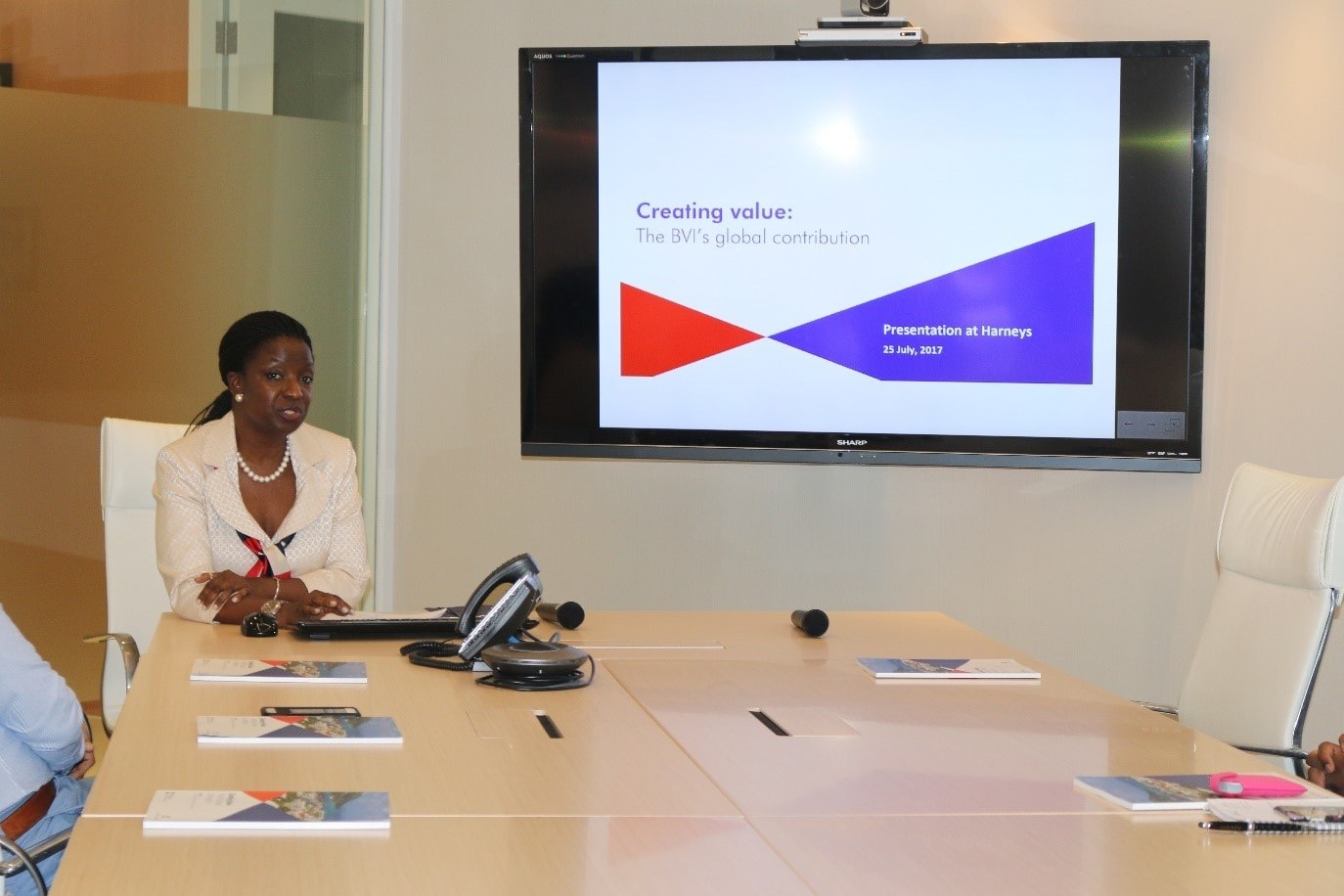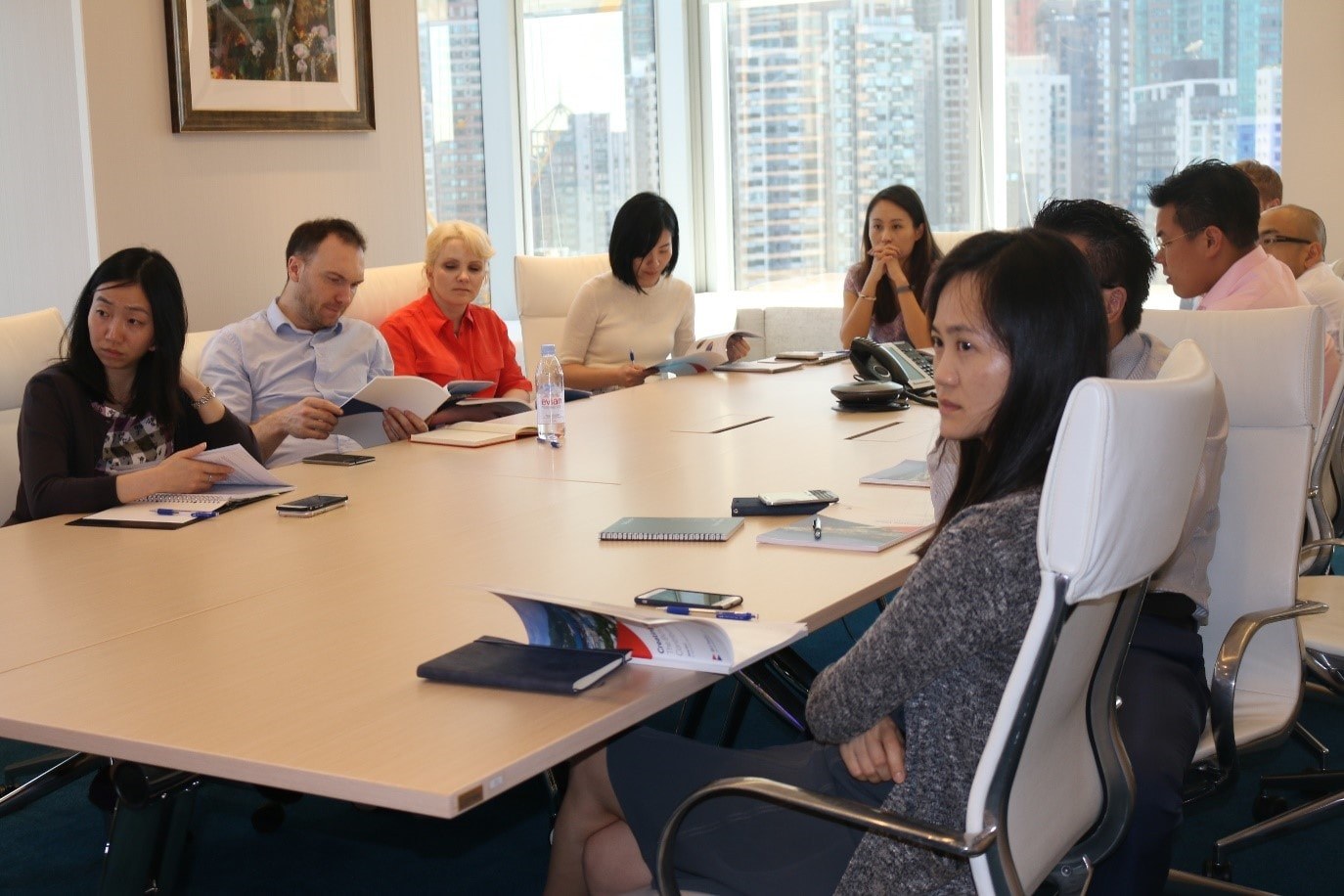Hong Kong, August 9, 2017 – Ms. Elise Donovan, Director of BVI House Asia, was invited to speak to Mourant Ozannes, Harneys and Vistra Hong Kong on July 21, July 2 and, August 9 respectively about the recently published report, Creating Value: BVI’s Global Contribution, undertaken by Capital Economics, an independent economics consultancy.

Ms. Donovan presented to each office a detailed introduction to the Capital Economics report as well as five myths about the BVI that the report debunks.
Myth 1. The BVI isn’t a real economy
“The report shows that the BVI is a real, mixed and sustainable economy, albeit a small one. When you look at the BVI and its level of economic activity, the BVI is a relatively prosperous Caribbean jurisdiction,” said Ms. Donovan. “Only one in ten jobs are related to international business and finance, and a quarter are related to tourism. Also, about a third of economic activity is directly from the international business and finance centre, so it’s a balanced economy. On top of that, you have a public sector that runs a deficit at times, but when you put that in context of the UK’s deficit, for example, you’ve actually got a government sector in the BVI which runs a reasonable budget, is sustainable, has an economy which is mixed and trading well. You have a more robust and sustainable economic framework than you might have in some large countries.”
Myth 2. The BVI a dodgy offshore centre
“What is not often understood is the central role played by the BVI and other IFCs in this global economy,” Ms. Donovan said. “Across the globe, these clusters of specialist centres serve the demands of cross-border financial activity. IFCs meet the needs of global businesses, investors, and internationally mobile individuals.
“Employment in the BVI’s business and financial services sector is dominated by corporate service providers and legal firms and is very much an incorporation centre,” Ms. Donovan continued. “The BVI’s unique selling proposition is that it has applied, consistent rule of law under English common law and the final right of appeal to London’s Privy Council.”

Myth 3. BVI companies are substance-less shell companies
Ms. Donovan said, “Actually, what the report demonstrates is that BVI’s Business Companies (BCs) are widely used, dependable vehicles for cross border business, cross border trade, cross border agreements, and cross border investments.
“Also, the Capital Economics presenter said that when they were carrying out the research, they were taken by the scale of usage of BVI BCs by major established blue-chip companies. He said they spent a lot of time going through the annual accounts of lots and lots of listed companies in London, in Hong Kong, and in New York and found that most of them use BVI BCs.
“What is notable is that 75 per cent of the companies listed on the Hang Seng Index have subsidiaries incorporated in the BVI,” Ms Donovan said. “BVI BCs are used to help grow small companies and make them bigger – they are very well deployed in London’s AIM market. BVI BCs are used to facilitate cross border investments into property, for example. A large chunk of what is seen as changing the skyline in London has been mediated by BVI BCs.”
Based on the United Nations’ Foreign Direct Investment (FDI) statistics in 2015, the BVI was the ninth largest recipient of FDI inward flows, and the seventh largest source of outward flows.
Myth 4. The BVI is a tax haven
“Capital Economics went back and looked at the old International Consortium of Investigative Journalists (ICIJ) database of Mossack Fonseca and they found some 214,000 offshore entities in the Panama Papers that were BVI registered entities,” Ms Donovan said. “Actually, only 30,000 of them are even tagged by the ICIJ as being currently active on the register. The majority of BVI Business Companies listed in the Panama Papers have been identified as either ‘inactive’, ‘discontinued’, ‘dissolved’ or ‘defaulted’.
“Given the stringent rules and systems now in place in the BVI to stop money laundering, financial crime and abuse of other jurisdictions’ tax codes, there is every reason to believe that the 30,000 active BVI Business Companies identified in the Panama Papers are legal and legitimate vehicles being used to facilitate cross-border trade and investment.”
Ms. Donovan added, “Mark Pragnell of Capital Economics points out that the BVI doesn’t have the cover of double taxation agreements. Tax neutrality, zero taxation for foreign business, isn’t a luxury in the BVI. But the BVI has willingly signed up to Tax Information Exchange Agreements (TIEAs), with 28 TIEAs in place already.
“The BVI is ahead of most in terms of transparency and other initiatives outlined by the OECD and other international standard setting bodies. It also has good compliance with a long range of international standards. So the tax haven label doesn’t fit too well.
“When you look at what the BVI is doing, the report demonstrates that the BVI is a net benefit to governments in terms of tax revenues around the world, so the BVI bolsters the receipts of governments worldwide,” said Ms. Donovan.
Myth 5. The BVI is a detriment to governments worldwide
“Most importantly the BVI supports jobs and prosperity worldwide,” Ms. Donovan said. “The report estimates that USD 1.5 trillion of investments are mediated by the BVI. This USD 1.5 trillion worth of investments is effectively supporting about 2.2 million jobs across the world. In the UK, it’s somewhere in the region of 150,000 jobs and 2.9 billion US dollars of tax benefits. In Europe it’s 4.2 billion US dollars in tax benefits and 290,000 jobs,” said Ms. Donovan. “In China and Hong Kong, about 870,000 jobs are supported by BVI investments that total 608 billion US dollars across the world.”

Ms. Donovan concluded, “This is the start of a more balanced narrative, a more positive and constructive narrative for the BVI. The Capital Economics report has debunked the myths and established the facts.”
Attendees commented that they found the seminar provided an informative overview of BVI’s contribution to the global economy, particularly in light of the recent issues or concerns around offshore vehicles.
For more information, please visit www.bviglobalimpact.com